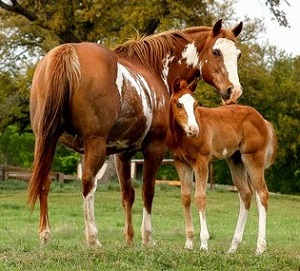 Because some horse breeds are known to be predisposed to certain genetic
conditions, mare owners typically scrutinize the risks before making
breeding decisions. They evaluate stallions’ histories, offspring,
conformation, health and pedigrees. As a 2016 Texas case showed, mare
owners should also pay attention to the language in the breeding contracts
they sign.
Because some horse breeds are known to be predisposed to certain genetic
conditions, mare owners typically scrutinize the risks before making
breeding decisions. They evaluate stallions’ histories, offspring,
conformation, health and pedigrees. As a 2016 Texas case showed, mare
owners should also pay attention to the language in the breeding contracts
they sign.
The Texas Case
In a Texas Federal Court case, the plaintiffs owned an American Quarter Horse mare, bred for cutting, which had never before been tested for a genetic condition called HERDA (Hereditary Equine Regional Dermal Asthenia). In an effort to reduce the risk of a foal affected by HERDA, the mare owners allegedly sought a stallion that was not a carrier of the HERDA gene.
As the lawsuit states, one of the mare owners asked the stallion owner whether the stallion was a HERDA carrier and was told – not in writing – that the stallion had tested “N/N” (double negative). Although the stallion owner’s website said nothing about the stallion’s HERDA status, the plaintiff argued that advertisements showed the stallion not being a carrier of the HERDA gene. Later, the parties entered into a Stallion Service Contract for the breeding. Their contract, however, was silent on the stallion’s HERDA genetic status.
The resulting foal turned out to be affected with HERDA, which was discovered after the horse was saddled during its training process. After that, the mare owners filed suit raising numerous legal theories that included breach of contract, fraud, negligence, violation of the Texas Deceptive Trade Practice Act, and more. The stallion owner sought to dismiss the breach of contract claim on the basis that the Stallion Service Contract made no statements or representations regarding the stallion’s HERDA status. A clause within the contract even stated that the written contract “contains the entire agreement between the parties and may be amended only in writing signed by each of the parties.” Because no evidence existed as to written amendments to the breeding contract regarding the stallion’s HERDA status, the court dismissed the mare owners’ breach of contract claims. Essentially, the ruling indicated, there was no contract to breed a HERDA negative stallion. The mare owners’ other claims were allowed to proceed, however.
Conclusion
Equine genetic conditions can have tremendous financial consequences on horse owners. If the genetic condition of a horse is important to you, whether you are planning to breed or buy a horse, make sure that the contract confirms details that are important to you. Request – and carefully review – copies of the horse’s genetic test results. Have your contract confirm in writing that the horse does not have the genetic conditions of concern to you (and consider listing the particular conditions).
A link to the Texas court ruling is here .
About the Author
Julie Fershtman is one of the nation’s most experienced Equine Law practitioners. A lawyer for 32 years, she is a Shareholder with Foster Swift Collins & Smith, PC, in Michigan. She has successfully handled equine cases in 18 jurisdictions nationwide and has tried equine cases in 4 states. She is listed in The Best Lawyers in America and is the recipient of the ABA's “Excellence in the Advancement of Animal Law Award.” Her speaking engagements span 29 states. For more information, please visit www.equinelaw.net.


Log in to join the conversation.